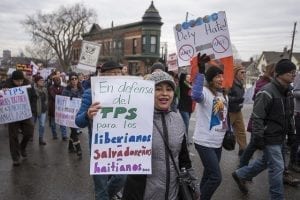Many TPS beneficiaries have lived in the United States for decades–and have children who are U.S. citizens.
A federal appeals court has ruled that the Trump administration can end temporary protected status designations for hundreds of thousands of immigrants living in the United States.
The 2-1 ruling, reports Reuters, was made by a three-judge panel of the 9th Circuit Court of Appeals. It reverses an earlier decision which prevented the Trump administration from ending TPS for affected beneficiaries.
Temporary protected status, or TPS, is an asylum-type measure that allows individuals to reside and work in the United States during times of natural disaster, civil unrest, or marked instability in their home countries. Approximately 400,000 people are covered by TPS, mostly from El Salvador, Haiti, Nicaragua and Sudan.
Immigrants with TPS are provided work permits and protection from deportation. Many—especially those from Central America—have lived in the United States for decades, with some serving as essential workers amidst the ongoing coronavirus pandemic.
The Trump administration attempted to eliminate TPS designations for citizens of El Salvador, Haiti, Nicaragua and Sudan between 2017 and 2018; CNN notes that the White House later ended TPS designations for Honduras and Nepal.
The administration’s decision received extensive criticism for human rights activists and immigration activists, who pointed out that many countries with former TPS designations continue to be unsafe.

While the federal government has insisted that TPS is no longer needed—Nicaraguans, for instance, were provided protected status following Hurricane Mitch in 1998—living conditions in designated countries have not necessarily improved. El Salvador and Honduras, for instance, lie at the epicenter of Central America’s gang crisis, with both countries having among the highest homicide rates in the world.
National Public Radio reports that several TPS beneficiaries—from El Salvador, Haiti, Nicaragua and Sudan—filed a joint lawsuit against the Trump administration, alleging that the government’s decision was grounded in racial animosity towards “non-white, non-European immigrants.”
In court documents, the plaintiffs pointed out that Trump himself has made disparaging comments about immigrants from less-developed countries in Latin America and the Caribbean.
But in a 54-page-long opinion, Judge Consuelo Callahan—a George W. Bush appointee—said that the Trump administration’s actions were not reviewable and therefore should not have been blocked.
“While we do not condone the offensive and disparaging nature of the president’s remarks, we find it instructive that these statements occurred primarily in contexts removed from and unrelated to TPS policy or decisions,” Callahan wrote.
NPR adds that the National TPS Alliance—a “grassroots advocacy group”—has criticized the court’s ruling, saying it will enable the Trump administration to tear apart families that have lived in the United States for decades.
The Alliance observes that many TPS beneficiaries have families with mixed citizenship statuses—in other words, many who came to the United States now have spouses and children who are naturalized or native-born U.S. citizens.
In many cases, the children of TPS recipients have never been to their parent or parents’ home country and would have to choose between staying with their family and remaining in the United States.
For that reason, Crista Ramos, one of the case’s lead plaintiffs, said the government has failed not only TPS beneficiaries but their children.
“This government has failed me and the other 250,000 U.S. citizen children of TPS holders,” Ramos said in a statement.
The American Civil Liberties Union, which represents the TPS beneficiaries and their families in this lawsuit, said it will seek another “en banc” review of the case by 11 of the appeals court’s judges.
Sources
Court Rules Government Can End Humanitarian Protections For Some 300,000 Immigrants
U.S. court allows Trump to phase out immigrant humanitarian protections


Join the conversation!